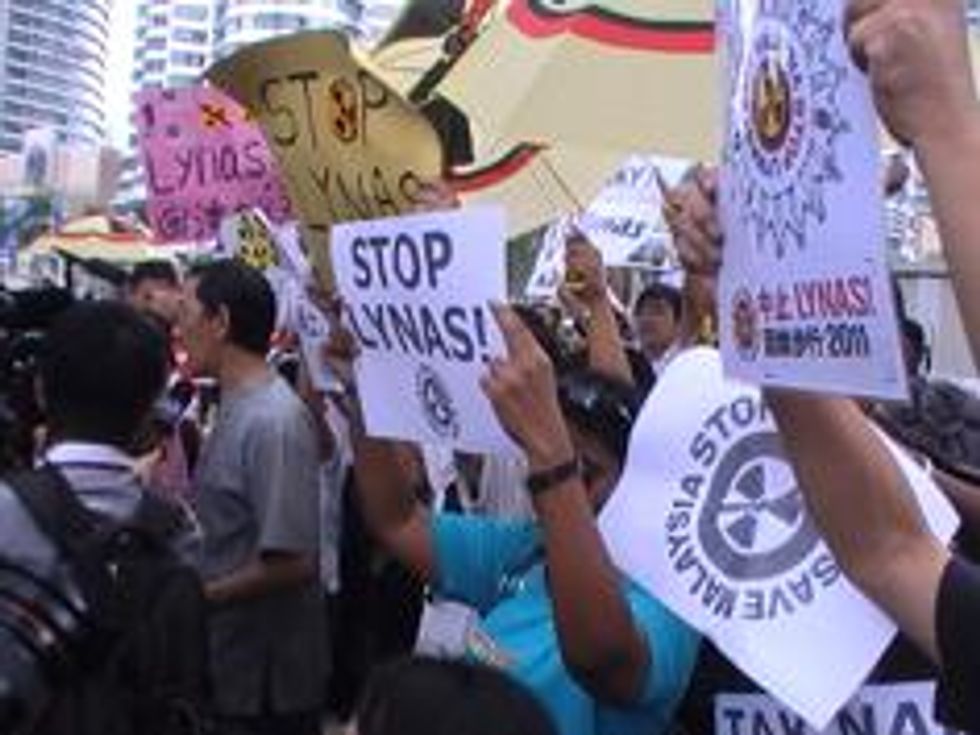The Australian company continues to face opposition from those who believe their rare earths processing plant in Malaysia risks human health and damage to the environment.
A Malaysian environmental group is demanding that Lynas Corp (ASX:LYC) close its processing facility at Kuantan, and brought its message on Friday to the company’s headquarters in Sydney, Australia.
The group known as Himpunan Hijau designed its protest to coincide with the company’s annual general meeting. Another environmental group, Save Malaysia Stop Lynas, held a similar protest at Lynas’ AGM last year.
The groups say that the plant poses a danger to human health and risks the environment, due to the radioactive waste generated by rare earth processing and the need to store the waste. The rare earth metals are shipped from Lynas’ Mount Weld mine in Australia for processing at the Malaysian facility, which started operating in 2012.
The Malaysian Insider reported that protesters got a boost from a chemist working for the Oeko Institute in Germany, who recently said the plant has limited storage capacity and that the waste is stored in a poor liner system.
The chairman of Himpunan Hijau said that 1.2 million Malaysians have signed a petition calling for the plant to be closed down, reported Malaysian Insider.
Lynas currently holds a two-year operating license for the facility, and one of the conditions of the license is the safe disposal of rare earth waste. The company has argued that much of the waste is recycled into aggregate products and sold to other industries.
Company news
Namibia Rare Earths (TSX:NRE), advancing its Lofdal project in Namibia, said earlier this month that significant progress has been made on the metallurgical test work. According to the Halifax-based company, “Significant improvements in grade and recoveries have been achieved on the high grade sample and the flow sheet is now being directed towards optimizing grades and recoveries of the low grade sample.”
Prices update
Price for the main rare earth metals and oxides sourced from China were down last week, due to weak downstream demand and buyers being cautious due to uncertainty regarding national stockpiling, according to Metal-Pages.
Prices for praseodymium/neodymium metal moved down about RMB10,000 compared to the prior week, to RMB410,000; oxide prices were also down to a range of between RMB315,000 and 320,000 per tonne, compared to RMB325,000 to 330,000 in previous days.
Dysprosium and terbium prices also softened, with 99% dysprosium oxide selling for RMB1,700 a kilogram, and 4N terbium oxide being sold in a range between RMB3,500 to 3,600, compared to an earlier RMB3,700 to 3,800. Prices for lanthanum and cerium were flat.
Meanwhile the first trade was completed through the Batou Rare Earth Products Exchange in China, a new market for trading rare earth oxides such as europium, lanthanum, praseodymium/neodymium, dysprosium, terbium as well as praseodymium/neodymium metal.
According to Metal-Pages, Baotou Rare Earths sold 5 tonnes of praseodymium oxide at RMB600,000 per tonne to Shanghai Jinze Rare Earth New Materials.
Securities Disclosure: I, Andrew Topf, hold no direct investment interest in any company mentioned in this article.
